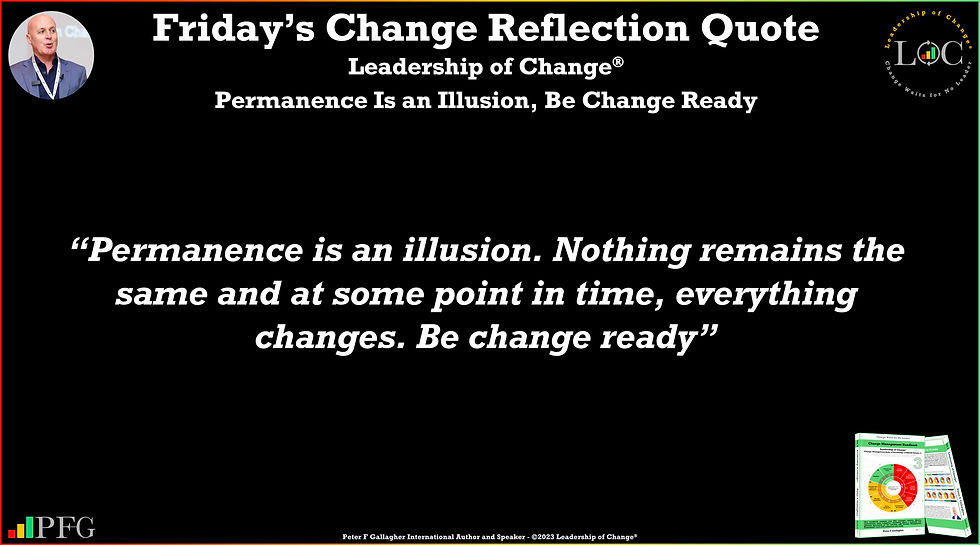

The illusion of permanence in financial reporting significantly hinders companies from adapting to a volatile financial environment. This article delves into the concept of embracing change in financial reporting practices, providing a practical framework for organizations to navigate the ever-evolving landscape and report accurately and transparently. Understanding that the financial world is dynamic and ever-changing is crucial, and ignoring this reality can lead to misaligned expectations and ultimately, financial mismanagement. This article addresses the critical challenges faced by organizations in effectively handling change and introduces actionable solutions for adapting reporting practices to remain relevant and accurate. This article will dissect this illusion of permanence through several key aspects including the importance of adaptability, the role of financial statement analysis, and practical strategies for embracing change in the context of financial reporting.
The Illusion of Permanence in Financial Reporting
Understanding the Root of the Problem
In today’s turbulent financial markets, the notion of permanence in financial reporting is misleading. The conventional understanding of financial reports often overlooks the dynamic and ever-changing nature of financial markets, which makes it critically important for organizations to acknowledge that the concepts and strategies they employ must also adapt. Failure to recognize these shifting circumstances can lead to outdated reporting methodologies, potentially leading to misaligned expectations and ultimately hindering the organization’s ability to accurately reflect financial reality. The challenge isn’t just the reporting itself, but effectively integrating adaptability into the core of financial processes. This necessitates a fundamental shift in organizational mindset, from the illusion of permanence to an acceptance of continuous evolution within financial reporting practices. This constant state of change requires proactive steps and a willingness to continuously evaluate and adjust strategies to maintain the effectiveness and relevance of financial reporting. This adaptability is vital for staying ahead in today’s ever-changing markets.
Adaptability in Financial Reporting
Integrating Change Management
Adaptability in financial reporting means more than just updating figures; it’s about integrating change management strategies into the very fabric of the organization. Financial reporting standards frequently evolve due to changing regulatory landscapes and economic shifts. Companies that fail to acknowledge and adapt to these shifts often find themselves relying on outdated methodologies and losing credibility with stakeholders. One key factor for embracing adaptability is the implementation of a formal change management process, which will assist in recognizing areas needing revision. Proactive engagement with regulatory changes and economic shifts is crucial to ensure that financial reporting practices remain aligned with the ever-changing landscape.
The Role of Financial Statement Analysis
Utilizing Data for Strategic Adjustments
Financial statement analysis plays a critical role in helping organizations recognize the need for adjustments to financial reporting. By closely scrutinizing financial statements, companies can identify trends, patterns, and inconsistencies that might signal areas requiring adjustments. For example, unexpected fluctuations in revenue or expenses can be indicative of external factors requiring a revised forecasting model. The analysis should not just be reactive to trends, but proactive, using forecasting to anticipate potential future shifts. Implementing a regular and consistent review of financial statements with the use of modern financial analysis software will aid in proactive adjustments.
Embracing Change in Financial Reporting
Implementing Actionable Strategies
Several actionable strategies can assist organizations in embracing change in financial reporting. This includes implementing predictive modeling to anticipate future changes and incorporating real-time data analysis to assess trends in the market, enabling proactive adjustment of strategies. Regular financial statement reviews, combined with effective communication and transparency with stakeholders, are also essential. Transparency strengthens stakeholder trust and builds a stronger connection with all those who rely on the accuracy of financial reports. For example, a company facing increasing competition might use data analysis to identify cost-cutting opportunities, adjust pricing strategies, or alter product offerings. These adjustments in financial reporting practices directly reflect the organization’s agility and preparedness in a dynamic financial world.
Case Study: Adapting to Regulatory Shifts
The Importance of Continuous Monitoring
Consider a company operating in a sector where regulations frequently change, such as healthcare or finance. Consistent monitoring of regulatory updates is essential to maintain compliance and reflect changes accurately in financial reporting. Failing to adapt to regulatory shifts can result in significant penalties and damage a company’s reputation. For example, changes in tax regulations or accounting standards can lead to a need for comprehensive restructuring of financial reporting practices to stay compliant. Proactive monitoring and evaluation of regulatory shifts are therefore essential.
How do I implement a proactive approach to change in my financial reports?
What are the benefits of embracing change in financial reporting for organizations?
FAQs
What are the key steps to adapt to changes in financial markets?
In conclusion, embracing the illusion of permanence in financial reporting is a significant hurdle for many companies. By acknowledging the inherent change and volatility in financial markets, organizations can adapt their strategies and reporting practices to better reflect reality. This proactive approach fosters transparency, builds trust with stakeholders, and ultimately contributes to long-term financial health. Implement a continuous improvement cycle within your financial reporting practices to better anticipate and adjust to future changes, and consider seeking expert advice or consulting firms specializing in financial reporting for guidance. This way, you can anticipate the challenges and opportunities that the ever-shifting landscape presents, thereby ensuring that your financial reports remain relevant, accurate, and effective in the dynamic business environment.